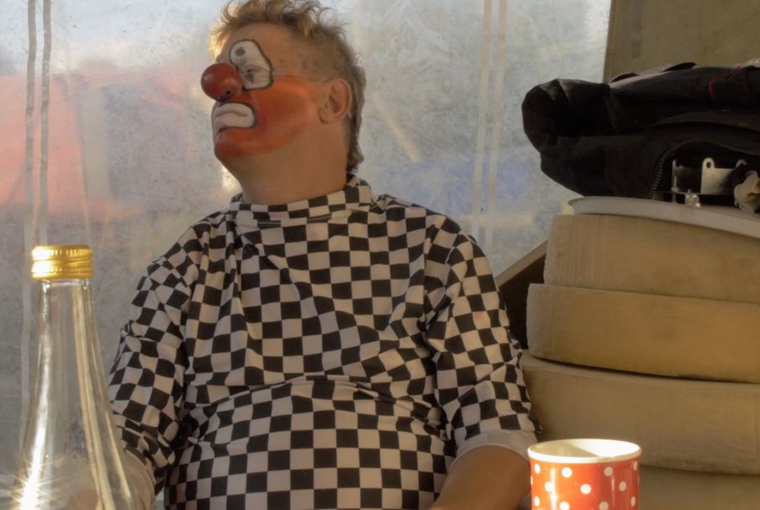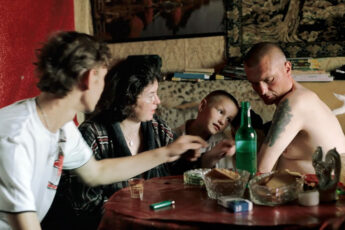
Living up to the stereotype of Russian film and painfully in keeping with the current zeitgeist, the title of Daria Slyusarenko’s documentary Joy is, inevitably, ironic. In fact, it refers to the name of a traveling circus from Moscow that trudges from nondescript Russian town to nondescript Russian town, spreading anything but joy. Roll up, roll up! Animal cruelty, alcoholism, racism, sexual harassment: this circus has it all.
Specifically, it follows two duo acts – Marina and Alexei, specialized in exotic animal performances, and Valeri and Yana, a pair of clowns. The former are romantically involved but with very little romance left, if indeed there ever was any. In a (tragic) sense, they are perfectly matched, Marina being the embodiment of fury and Alexei of meekness. In their cluttered caravan filled with yappy dogs, Marina directs a constant torrent of anger at Alexei, who does his best to placate her but can’t do anything right. He forgets to take care of the animals (or “his” animals, as Marina is constantly reminding him, like a mother whose child forgot to feed a pet), he ruins their routine and can’t even zip up her sequined jumpsuit properly. While Alexei does seem quite incompetent, it’s clear that he’s the oppressed party in an abusive relationship, and whenever he attempts to bond with the other troupe members Marina does her best to alienate him from them.
Valeri and Yana, on the other hand, start working together during the course of the film after Valeri parts ways with his former partner. While little is revealed of his past, Valeri has the air of someone who once brushed with greatness only to come crashing into failure, ending up in debt and alone but with delusions of self-importance. The appearance of Yana, who is comparatively young and glamorous, with the added mystique of someone who has spent a long time working abroad, seems to represent a chance for a kind of fresh start for him. Things go wrong before she even arrives, however, as he lustily describes her physical attributes to the director on the basis of her photo, clearly under the impression that he has some right of ownership over her in this regard. Thankfully, Yana is tough enough to stand her ground, but it’s hard to watch. The two of them fight constantly over creative differences and then when they drink Valeri makes bizarre, confused advances to her.
While films about circus culture tend to either focus on the sense of nomadic community or mourn the impending loss of some particular skill, in this instance it just provides a surreal backdrop to the world’s most depressing soap opera. Singling out a microcosm often serves as a commentary on the state of the nation as a whole, which would be too dismal an interpretation to contemplate here. It’s hard to get much of a sense of the circus itself beyond the four central characters, so perhaps some of the other performers are well adjusted and content in their lives, and let’s hope so for their sake. On the basis of the characters we do see, however, it’s hard to imagine what led them to a career in the circus and what drives them to keep going with it. The two clowns do seem to have some veneration for the art of clowning, but how you suddenly find yourself with a bear, a pair of lynxes and a menagerie of exotic birds is less self-evident. Economic factors clearly play a role, with evidence of money problems scattered all around, but this doesn’t seem to be the determining aspect that keeps them all bound together.
It’s equally intriguing to speculate on director Slyusarenko’s relationship to the circus in general and this one in particular before shooting and how that may have changed during the process. The film doesn’t appear to have any analytical intention to it beyond providing a portrait of this group of people and the dynamics between them, but it must have been intense to document. Her intimacy with the protagonists is very apparent from their openness in front of the camera, although in several telling instances they acknowledge her presence by looking into the lens or making comments to her. This not only reveals that they were never fully unaware of the filmmaking process, which is basically always the case in documentary anyway, but also disturbingly suggests that the scenes might have been even more drastic had she not been there to capture them.
As a viewing experience, Joy is the equivalent of being stuck at a bar with a bunch of obnoxious drunks. You can practically smell the cheap vodka. In the end, if offers little redemption beyond the potential promise of escape, for the performers and animals alike – even though when one of the lynxes manages to make a bid for freedom, he sadly gets caught and returned to his oppressive cage. While it doesn’t make for uplifting watching, it is still somehow refreshing to see a film acknowledge that not all traditions need to be salvaged and sometimes it’s okay for a culture to move on from toxic customs.




Leave a Comment